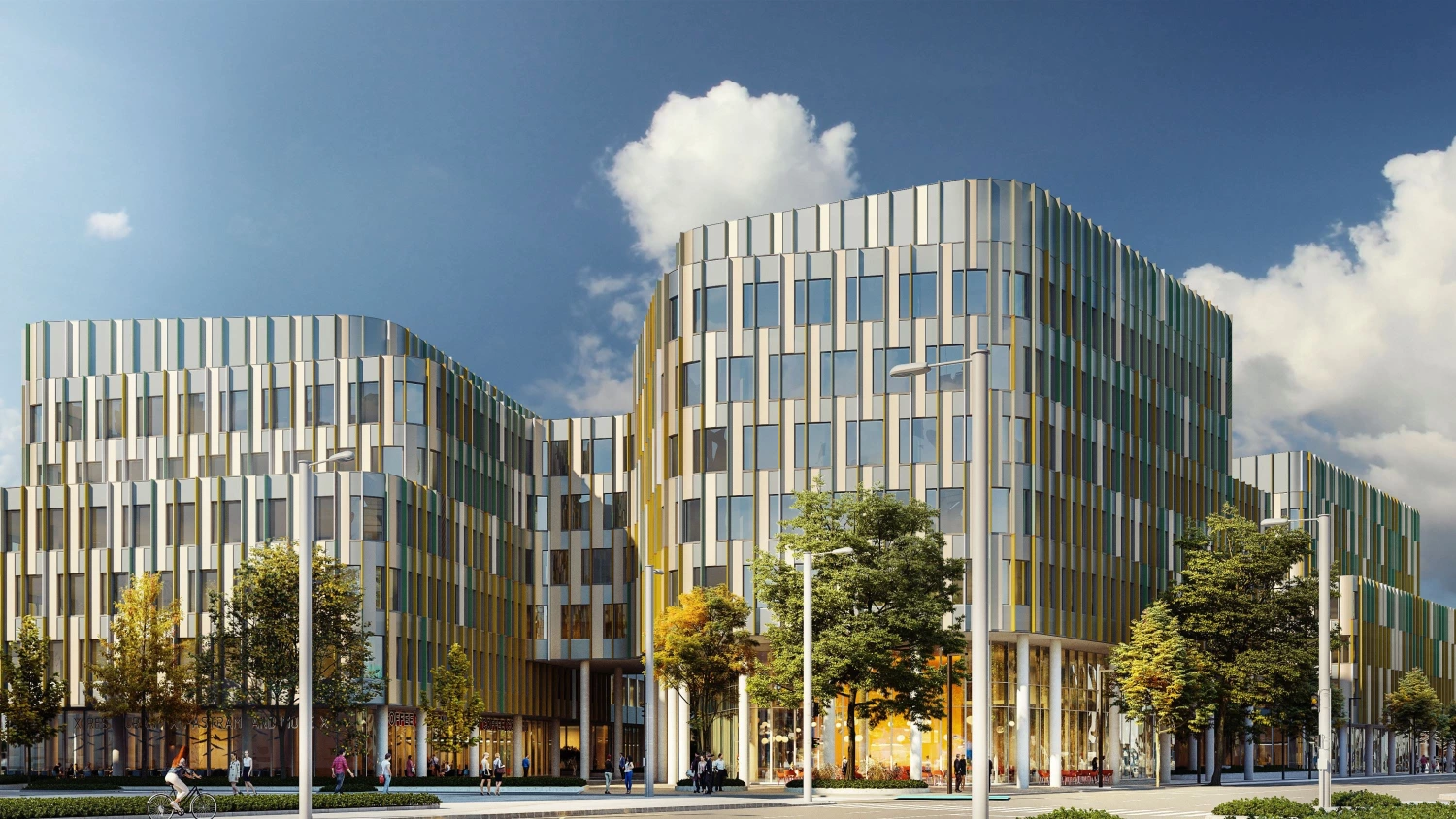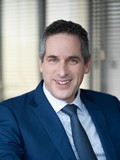
Yovav Carmi, CEO and Ariel Ferstman, CFO of Globe Trade Centre talked to Property Forum about GTC`s recent acquisitions, the sale of the Serbian office portfolio, coping with COVID-19's long-term effects and their new investment strategy.
A few weeks ago Globe Trade Centre has announced the purchase of three Class A office buildings in Budapest. It is supposed to be a part of the new strategy of refreshing your portfolio with more modern and eco-friendly office buildings located in the CEE region. Can you tell us a little bit more about that strategy?
Yovav Carmi: Yes. We have just purchased the Vaci Greens „D” office building with a BREEAM „Excellent” certification. It was completed in 2018 and currently is 98% leased. Its main tenants are Unilever and Avon. Vaci Greens „D” is a part of a larger office park and is generating €2.9 million of in-place rent. The second building is the HQ of Ericsson, which was completed in 2017. It is located in the 11th district, just on the riverbank of the Danube. It has a LEED Gold certificate, is fully let and is generating €4.2 million. For Ericsson, it is their largest R&D facility outside Sweden. We bought it in one transaction of €160 million together with the Siemens Evosoft headquarters. It is a brand new building, completed in 2020. It has a LEED Gold certification and is generating €4.7 million. Both of these buildings are located near the Technical University in Budapest, so this is kind of a strategic location for those two companies. The new acquisitions constitute just a part of our strategy which is mostly focused on changing the financing structure of GTC Group from secured financing (project loans) to predominantly unsecured financing (Eurobonds). The be able to utilize all the possibilities that the Eurobonds market gives, we strive to be an investment-grade company. To achieve that, we need to focus more on offices in higher-rated economies, grow our portfolio in a reasonable manner and decrease our leverage towards 40%. We are very committed to achieving that.
When publishing your recent financial results, you mentioned that GTC wants to focus more on Poland and Hungary. Does it mean that you plan to sell your assets in other CEE countries?
Yovav Carmi: It is true that we want to focus on Hungary and on Poland. W have identified a tangible pipeline for those markets and the first effects of this strategy, visible to the larger audiences are the acquisitions I`ve just told you about. However, we are not planning to completely exit other CEE markets. Our activities in these markets were successful and we plan to stay there - we have the team on the ground, we have the „know-how” and as such we will remain active in those markets. But we are planning to rebalance the portfolio towards Poland and Hungary and as a part of this balancing, we are not excluding disposal in other markets. As published recently, we have decided to sell our Belgrade office portfolio to a Hungarian investor. The sale price is €267.6 million, exceeding the book value of GTC’s Serbia portfolio by approx. €2 million. The agreement will cover the sale of 11 buildings within 5 business parks of a total 122,175 sqm GLA with high occupancy rates, located in the New Belgrade district. Once completed in Q3 2021, the sale will become one of the largest real estate transactions in the last 5 years on the CEE market.
The sale of 11 premium class office buildings in Belgrade is a bold move, which will allow us to complete our development cycle in Serbia and start a fundamentally different chapter on this market. The sale of the Serbian portfolio couldn’t be timelier, as we are currently in process of redefining market strategy and advancing our operations to be more sustainable and futureproof. This is a benchmark transaction in Belgrade demonstrating liquidity post-COVID. Selling some of our assets and relocating the free cash flow for the development of brand-new, ambitious projects in Serbia and other markets of CEE is truly an “exit on a strong note”, which will drive us forward. After the agreement is finalized, GTC will become one of the first companies to complete the development circle in Serbia – from land acquisition and construction, through years of enjoying the high rent levels and free cashflow, to the exit on respectable terms. This opportunity will help re-balance the company’s portfolio towards higher-rated countries including Poland and Hungary.

Yovav Carmi
President of the Management Board
GTC Group

Ariel Ferstman
Chief Financial Officer
GTC
Your recent acquisition will be financed from equity combined with bank financing and green bonds. Could you please elaborate on that?
Ariel Ferstman: Yes, these specific transactions that you have mentioned were financed partially from a green bond issuance that we did in Hungary in December and March. We were very successful with it and we managed to raise over €160 million in green bonds. In addition, we have secured five-year financing for Vaci Greens D with one of our long-term bank partners. Regarding the financing policy of the company, we are indeed trying to change our debt structure. Even during the COVID times, we have seen that the bond market has been demonstrated a higher degree of liquidity in comparison to secure financing. We strongly believe that the GTC should be part of that market as well, and have the access to those capitals. So, we are cooperating with big reputable investment banks in order to help us out to start implementing the strategy of shifting the company from secure financing to predominantly unsecured financing. We are in the process to obtain an international rating. We are working with the major rating agencies and we are hoping to obtain the highest rating possible in comparison with similar peers for the potential placement of €500 million bonds on the market. The idea is to be able to close this transaction by early summer, by the middle of June. We also plan a capital increase for up to 20% of equity to be completed before summertime, which will enhance our capital structure towards investment grade similar peers and allow us to gradually grow our portfolio. The first discussions with our main shareholders are very promising and we believe that the transaction will be well accepted by the market.
What are your long term forecasts when it comes to financing office and retail investments? Do you think that banks will limit the interest in these kinds of assets?
Ariel Ferstman: In the last six months, we have seen some sort of reluctance from the banks to finance retail assets. It's been getting hard to finance them, given the negative sentiment in the market due to the COVID-19. We have not experienced that on the bond market though. As for the office properties, banks are still open for business. However, certain conditions have changed - such as covenants - also pricing has been getting more and more expensive. The banks now also tend to implement new covenants, such as a minimum WALT (weight average lease terms) covenant, that has not been implemented in the past. All this together makes secure financing for office investments a less flexible one. But again, the bond market has been performing very strong for the office developers. We've seen it in Western Europe, but also in our region as well.
All your 18 buildings in Poland – both office and retail ones - have been awarded green certificates. Why are the green certificates so important to you?
Yovav Carmi: It is correct, all our buildings in Poland have a green certificate. Our whole portfolio is certified in 84% and so are the recent acquisitions that we just discussed. More and more often we see the tenants, both large and smaller ones, completely disqualifying your buildings if you do not have the green certificate. The same situation is with the investors – you will not sell a building, which is not certified. This is the general trend, this is where the business is going and we cannot find ourselves behind. In some SEE countries and in the Balkans, the fact that we can offer a green, certified building is an advantage compared to our competitors, because the green certification is more scarce there. So for the international blue-chip tenants, we are an obvious choice when they come to these markets because only we can offer that to them. And this is a policy that is dictated to them from a head office in North America or in Western Europe. So this is the reason for us to go in that direction. In a few weeks, we will also publish our first ESG report, in which we will say more about our direction of thinking.
I believe that you heard my next question at least a hundred times before, but I really need to ask it. How is GTC coping with the general slowdown on the CEE office market, obviously related to COVID-19 pandemic?
Yovav Carmi: In 2020, despite the COVID-19 and slower decision-making processes among our tenants, we managed to secure 70,000 square meters of offices, a large portion of which were new deals. In Q1 2021 alone, we managed to lease 40,000 square meters, so it a positive and clear signal that gradual revival of the office market is already happening. Of course, the pace in the market is still slower than before the COVID. But the facts show that it is recovering: we have been seeing quite long lockdowns in Poland, Bulgaria or Serbia, but very good results of Q1 show us that occupiers are willing to commit. Looking from the wider perspective, people have been talking about introducing a hybrid model of work, about occupiers reducing their requirements and maybe modifying their working habits to a certain extent, and I think there's a good chance that this will happen. But one has to bear in mind, that there are also counter-trends. The first thing is the fact, that office environments in our buildings are very well-designed and comfortable for work. And in the countries that we operate in, most of the apartments that people live in are not designed for long-term sustainable work in a home office formula. So during the online meetings, you see people working from their kitchen table or from their bedroom, from all kinds of strange places. In our opinion, this is not a sustainable working environment and this will bring back people to the office, not to mention cyber risks, etc. One has also to bear in mind that, in the last few years, in order to be more efficient and to reduce the rental costs, companies were squeezing their employees, as many as possible, into smaller and smaller areas. And now this will have to be reversed and the employees will have to be dispersed in a wider area. The third thing is macroeconomics - and we heard it from quite a few tenants. Large multinational companies are considering reducing their worldwide office requirements and the cost of office rent in Eastern Europe, compared to Western countries is much lower; so is the cost of labour. So, in order to save money, many companies may consolidate into Eastern Europe: it has the same timezone as Western Europe, cities like Wrocław or Poznań are only a three-hour drive from Berlin. It's a natural choice, very favourable for our region.
I would like to ask you for a similar commentary, but about the situation on the retail market, which is not so promising as the office one…
Yovav Carmi: Again, I turn to the macroeconomic parameters. If you look at the e-commerce growth in retail in Western Europe, compared to the CEE region, it is much higher, it's almost double. Online shopping in countries like Poland, Hungary, Serbia or Romania is still very small compared to Germany, France or the UK. So the threat of online shopping is much smaller in CEE countries. Occupancy in our shopping centres is 96% on average today. In Galeria Północa, which was the latest one to open in Poland, today we have the highest occupancy since we opened the mall, at 94%. In spite of the COVID, we managed to sign tenants like Sinsay, Mango or IKEA. CCC has just announced a new brand called Half Price and one of the few new locations for it is Galeria Północna. So this demonstrates the confidence of the retailers to expand and to open new shops in physical shopping centres. It is another encouraging factor. And the last thing is, that when we just reopened in Poland after the longest lockdown, in the first few days our centres were extremely crowded with more than 20,000 visitors per day, which is much more than what we used to see before the pandemic. So those are actually encouraging factors. With the accelerated speed of vaccination campaigns, I think we will start seeing the markets opening up.
So you're not switching to retail parks?
Yovav Carmi : In real estate, whatever people tell you, overnight switching is not possible (laugh), you cannot quickly switch from one segment to the next.
Could you tell our readers a little bit about your investment plans for the next 24 months?
Yovav Carmi: First of all, you saw a few acquisitions. The second is that we have two ongoing developments at the moment: one office building in Budapest, which is already fully let to a blue-chip tenant. That's 29,000 square meters to be completed by the end of the year. The other one is in Sofia, an office building of 8,000 square metres that we started last year and we plan to complete it by Q2 of 2022. As I mentioned before, we see quite a revival in the office sector. So now we have a quite interesting pipeline of letting. And there are two additional office projects that are ready to start at any moment, once we feel comfortable with them and see the sufficient leasing demand. Those are Center Point 3 in Budapest with 35,500 square meters and GTC X in Belgrade, for which we are negotiating with a few large tenants. Once we get the positive feedback, hopefully, we will move forward with those developments.
Your development in Poland has slowed down in recent years. Why?
Yovav Carmi: Warsaw is a crowded place, and profitability is tighter than in other markets, especially if you look at the cost of funding versus yields for development. We are not leaving Poland or Warsaw. It is not a coincidence that we said Poland and Hungary is where we would like to focus our business. Poland has strategic importance for us and we do see viable opportunities for investment. It's premature to discuss our potential acquisition plan as part of rebalancing our portfolio, so beyond that, we cannot disclose at the moment.



